Financial Information System Analysis and Recommendations Report
VerifiedAdded on 2022/11/16
|7
|1485
|237
Report
AI Summary
This report, titled "Financial Information System," analyzes the financial information system, specifically focusing on Enterprise Resource Planning (ERP) systems within the context of Birmingham City University (BCU). The report begins by defining ERP and exploring its role in managing business activities, including planning, sales, finance, marketing, and human resources. It then delves into the issues and risks associated with ERP implementation, such as selecting the right software, system training, budget considerations, testing requirements, and data security concerns. The report outlines pre-implementation planning, detailing various testing methods like manual, automation, and performance testing. Furthermore, it discusses post-implementation reviews to assess the ERP system's performance, benefits, and cost-effectiveness. The conclusion emphasizes the benefits of ERP for BCU while acknowledging the associated risks and the importance of thorough testing and reviews for successful implementation.
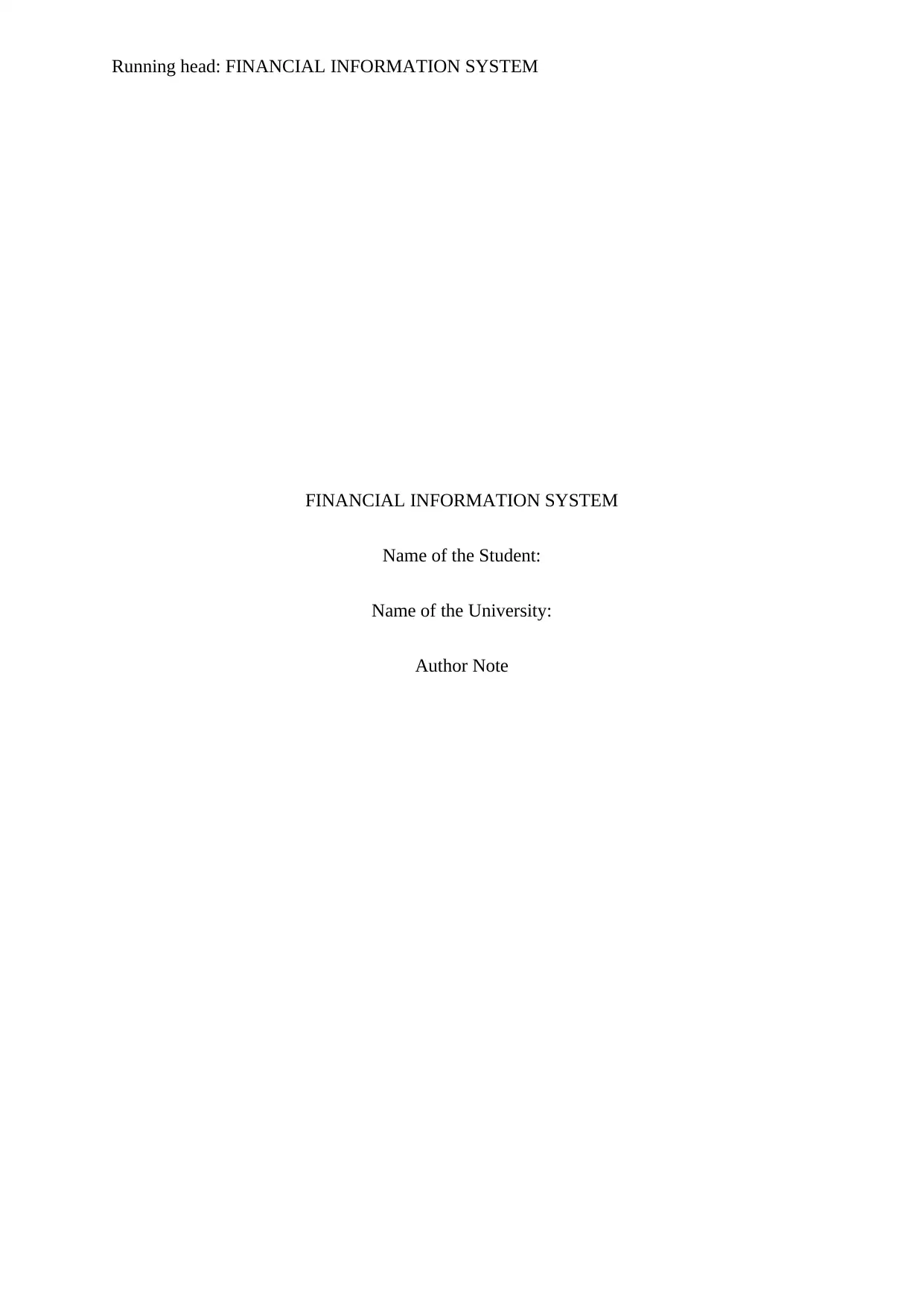
Running head: FINANCIAL INFORMATION SYSTEM
FINANCIAL INFORMATION SYSTEM
Name of the Student:
Name of the University:
Author Note
FINANCIAL INFORMATION SYSTEM
Name of the Student:
Name of the University:
Author Note
Paraphrase This Document
Need a fresh take? Get an instant paraphrase of this document with our AI Paraphraser
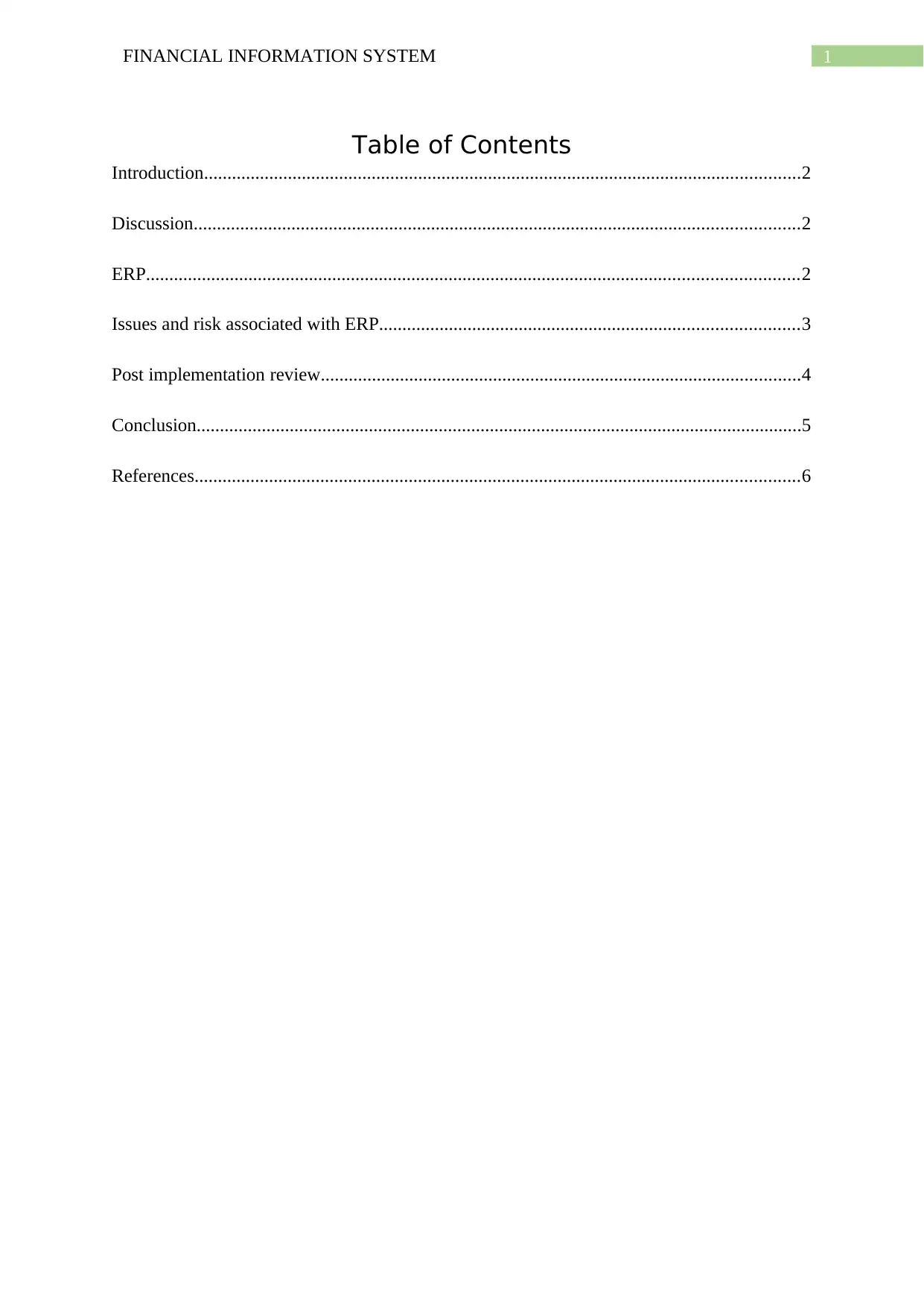
1FINANCIAL INFORMATION SYSTEM
Table of Contents
Introduction................................................................................................................................2
Discussion..................................................................................................................................2
ERP............................................................................................................................................2
Issues and risk associated with ERP..........................................................................................3
Post implementation review.......................................................................................................4
Conclusion..................................................................................................................................5
References..................................................................................................................................6
Table of Contents
Introduction................................................................................................................................2
Discussion..................................................................................................................................2
ERP............................................................................................................................................2
Issues and risk associated with ERP..........................................................................................3
Post implementation review.......................................................................................................4
Conclusion..................................................................................................................................5
References..................................................................................................................................6
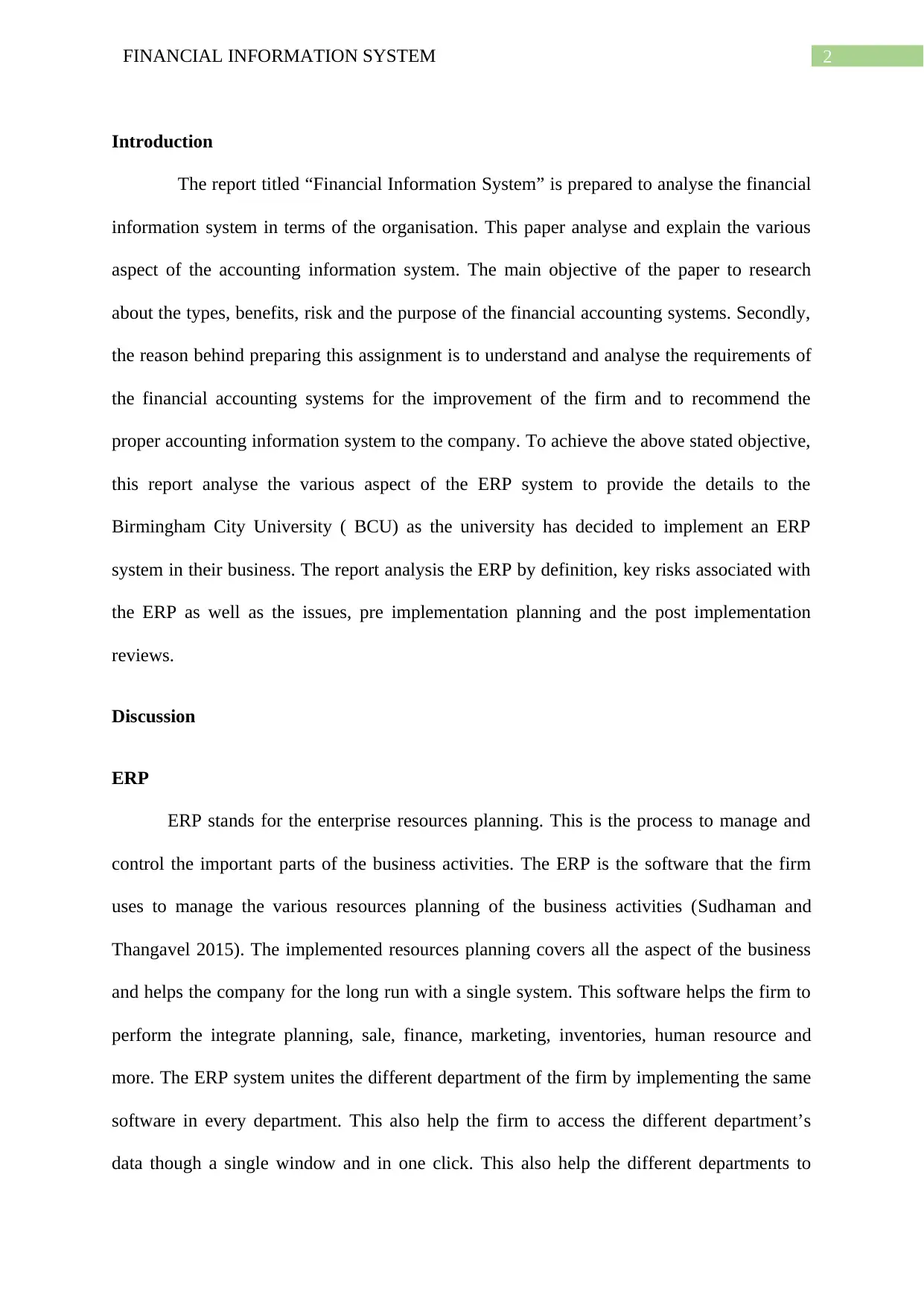
2FINANCIAL INFORMATION SYSTEM
Introduction
The report titled “Financial Information System” is prepared to analyse the financial
information system in terms of the organisation. This paper analyse and explain the various
aspect of the accounting information system. The main objective of the paper to research
about the types, benefits, risk and the purpose of the financial accounting systems. Secondly,
the reason behind preparing this assignment is to understand and analyse the requirements of
the financial accounting systems for the improvement of the firm and to recommend the
proper accounting information system to the company. To achieve the above stated objective,
this report analyse the various aspect of the ERP system to provide the details to the
Birmingham City University ( BCU) as the university has decided to implement an ERP
system in their business. The report analysis the ERP by definition, key risks associated with
the ERP as well as the issues, pre implementation planning and the post implementation
reviews.
Discussion
ERP
ERP stands for the enterprise resources planning. This is the process to manage and
control the important parts of the business activities. The ERP is the software that the firm
uses to manage the various resources planning of the business activities (Sudhaman and
Thangavel 2015). The implemented resources planning covers all the aspect of the business
and helps the company for the long run with a single system. This software helps the firm to
perform the integrate planning, sale, finance, marketing, inventories, human resource and
more. The ERP system unites the different department of the firm by implementing the same
software in every department. This also help the firm to access the different department’s
data though a single window and in one click. This also help the different departments to
Introduction
The report titled “Financial Information System” is prepared to analyse the financial
information system in terms of the organisation. This paper analyse and explain the various
aspect of the accounting information system. The main objective of the paper to research
about the types, benefits, risk and the purpose of the financial accounting systems. Secondly,
the reason behind preparing this assignment is to understand and analyse the requirements of
the financial accounting systems for the improvement of the firm and to recommend the
proper accounting information system to the company. To achieve the above stated objective,
this report analyse the various aspect of the ERP system to provide the details to the
Birmingham City University ( BCU) as the university has decided to implement an ERP
system in their business. The report analysis the ERP by definition, key risks associated with
the ERP as well as the issues, pre implementation planning and the post implementation
reviews.
Discussion
ERP
ERP stands for the enterprise resources planning. This is the process to manage and
control the important parts of the business activities. The ERP is the software that the firm
uses to manage the various resources planning of the business activities (Sudhaman and
Thangavel 2015). The implemented resources planning covers all the aspect of the business
and helps the company for the long run with a single system. This software helps the firm to
perform the integrate planning, sale, finance, marketing, inventories, human resource and
more. The ERP system unites the different department of the firm by implementing the same
software in every department. This also help the firm to access the different department’s
data though a single window and in one click. This also help the different departments to
⊘ This is a preview!⊘
Do you want full access?
Subscribe today to unlock all pages.

Trusted by 1+ million students worldwide
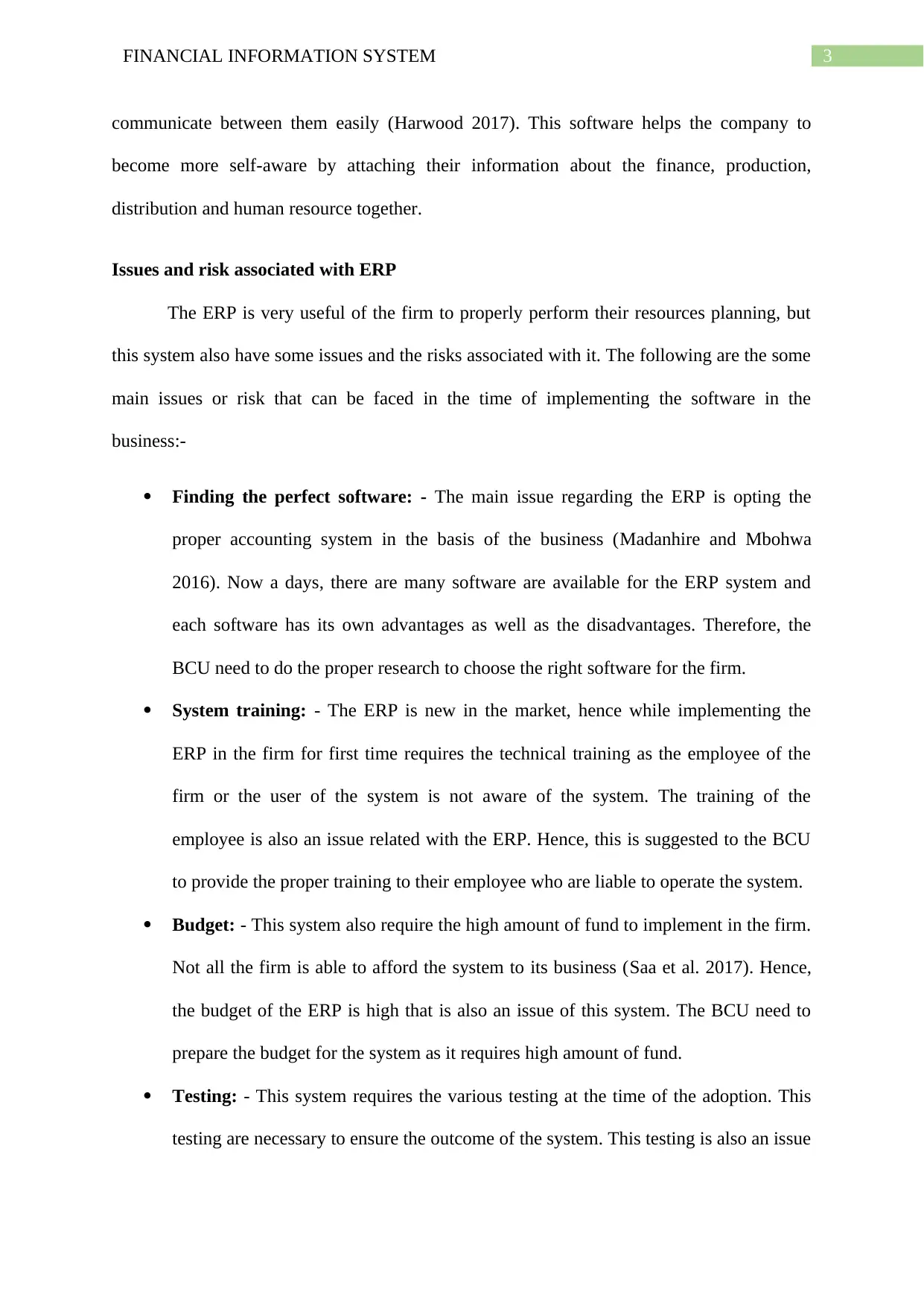
3FINANCIAL INFORMATION SYSTEM
communicate between them easily (Harwood 2017). This software helps the company to
become more self-aware by attaching their information about the finance, production,
distribution and human resource together.
Issues and risk associated with ERP
The ERP is very useful of the firm to properly perform their resources planning, but
this system also have some issues and the risks associated with it. The following are the some
main issues or risk that can be faced in the time of implementing the software in the
business:-
Finding the perfect software: - The main issue regarding the ERP is opting the
proper accounting system in the basis of the business (Madanhire and Mbohwa
2016). Now a days, there are many software are available for the ERP system and
each software has its own advantages as well as the disadvantages. Therefore, the
BCU need to do the proper research to choose the right software for the firm.
System training: - The ERP is new in the market, hence while implementing the
ERP in the firm for first time requires the technical training as the employee of the
firm or the user of the system is not aware of the system. The training of the
employee is also an issue related with the ERP. Hence, this is suggested to the BCU
to provide the proper training to their employee who are liable to operate the system.
Budget: - This system also require the high amount of fund to implement in the firm.
Not all the firm is able to afford the system to its business (Saa et al. 2017). Hence,
the budget of the ERP is high that is also an issue of this system. The BCU need to
prepare the budget for the system as it requires high amount of fund.
Testing: - This system requires the various testing at the time of the adoption. This
testing are necessary to ensure the outcome of the system. This testing is also an issue
communicate between them easily (Harwood 2017). This software helps the company to
become more self-aware by attaching their information about the finance, production,
distribution and human resource together.
Issues and risk associated with ERP
The ERP is very useful of the firm to properly perform their resources planning, but
this system also have some issues and the risks associated with it. The following are the some
main issues or risk that can be faced in the time of implementing the software in the
business:-
Finding the perfect software: - The main issue regarding the ERP is opting the
proper accounting system in the basis of the business (Madanhire and Mbohwa
2016). Now a days, there are many software are available for the ERP system and
each software has its own advantages as well as the disadvantages. Therefore, the
BCU need to do the proper research to choose the right software for the firm.
System training: - The ERP is new in the market, hence while implementing the
ERP in the firm for first time requires the technical training as the employee of the
firm or the user of the system is not aware of the system. The training of the
employee is also an issue related with the ERP. Hence, this is suggested to the BCU
to provide the proper training to their employee who are liable to operate the system.
Budget: - This system also require the high amount of fund to implement in the firm.
Not all the firm is able to afford the system to its business (Saa et al. 2017). Hence,
the budget of the ERP is high that is also an issue of this system. The BCU need to
prepare the budget for the system as it requires high amount of fund.
Testing: - This system requires the various testing at the time of the adoption. This
testing are necessary to ensure the outcome of the system. This testing is also an issue
Paraphrase This Document
Need a fresh take? Get an instant paraphrase of this document with our AI Paraphraser

4FINANCIAL INFORMATION SYSTEM
for the ERP as it require all the related information data of the company to complete
the tests at the time of implementation.
Security: - As the system is fully based on the software and need a system as well as
the internet connective hence, the security of the data always remain an important
risk associated with it. The BCU should discuss about the security issue with its IT
expert and take precaution before implementation.
Pre implementation planning
The various important test required at the time of implementing the ERP is the
business performance. In case of the BCU, the followings are the important tests:-
Manual testing: - In this testing, involve the test of payment module, funding
module, payroll module, fixed asset module and likes.
Automation testing: - This test involves the testing of sales module, purchase
module, customer module, and human resource module and likes (Venkatraman and
Fahd 2016).
System testing: - this testing involve all the tests of the system.
Integration Testing: - This involves the testing of all the integration related testing.
Performance Testing: - In this, all the performance related tests are performed.
Apart from the above stated tests, there are various other tests which are need to be
perform for the implementation of the ERP in the business activity (Misra, Bisui and
Mahapatra 2018).
Post implementation review
The post implementation review cover the performance of the system that shows
whether the software is performing well or not. This also analyse the outcomes of the
software, as it is favourable for the firm or not (Asgar and King 2016). This also analyse the
for the ERP as it require all the related information data of the company to complete
the tests at the time of implementation.
Security: - As the system is fully based on the software and need a system as well as
the internet connective hence, the security of the data always remain an important
risk associated with it. The BCU should discuss about the security issue with its IT
expert and take precaution before implementation.
Pre implementation planning
The various important test required at the time of implementing the ERP is the
business performance. In case of the BCU, the followings are the important tests:-
Manual testing: - In this testing, involve the test of payment module, funding
module, payroll module, fixed asset module and likes.
Automation testing: - This test involves the testing of sales module, purchase
module, customer module, and human resource module and likes (Venkatraman and
Fahd 2016).
System testing: - this testing involve all the tests of the system.
Integration Testing: - This involves the testing of all the integration related testing.
Performance Testing: - In this, all the performance related tests are performed.
Apart from the above stated tests, there are various other tests which are need to be
perform for the implementation of the ERP in the business activity (Misra, Bisui and
Mahapatra 2018).
Post implementation review
The post implementation review cover the performance of the system that shows
whether the software is performing well or not. This also analyse the outcomes of the
software, as it is favourable for the firm or not (Asgar and King 2016). This also analyse the
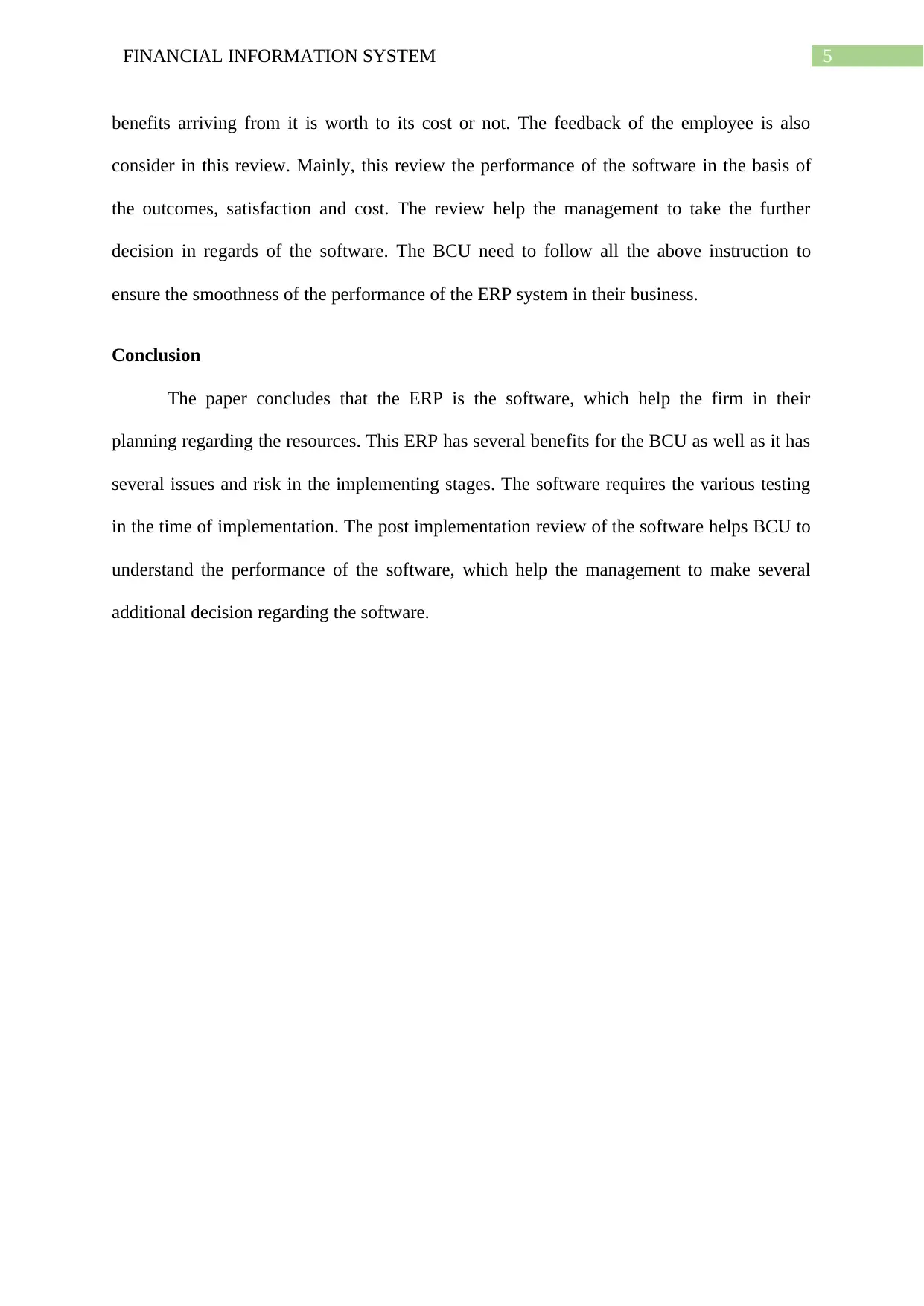
5FINANCIAL INFORMATION SYSTEM
benefits arriving from it is worth to its cost or not. The feedback of the employee is also
consider in this review. Mainly, this review the performance of the software in the basis of
the outcomes, satisfaction and cost. The review help the management to take the further
decision in regards of the software. The BCU need to follow all the above instruction to
ensure the smoothness of the performance of the ERP system in their business.
Conclusion
The paper concludes that the ERP is the software, which help the firm in their
planning regarding the resources. This ERP has several benefits for the BCU as well as it has
several issues and risk in the implementing stages. The software requires the various testing
in the time of implementation. The post implementation review of the software helps BCU to
understand the performance of the software, which help the management to make several
additional decision regarding the software.
benefits arriving from it is worth to its cost or not. The feedback of the employee is also
consider in this review. Mainly, this review the performance of the software in the basis of
the outcomes, satisfaction and cost. The review help the management to take the further
decision in regards of the software. The BCU need to follow all the above instruction to
ensure the smoothness of the performance of the ERP system in their business.
Conclusion
The paper concludes that the ERP is the software, which help the firm in their
planning regarding the resources. This ERP has several benefits for the BCU as well as it has
several issues and risk in the implementing stages. The software requires the various testing
in the time of implementation. The post implementation review of the software helps BCU to
understand the performance of the software, which help the management to make several
additional decision regarding the software.
⊘ This is a preview!⊘
Do you want full access?
Subscribe today to unlock all pages.

Trusted by 1+ million students worldwide
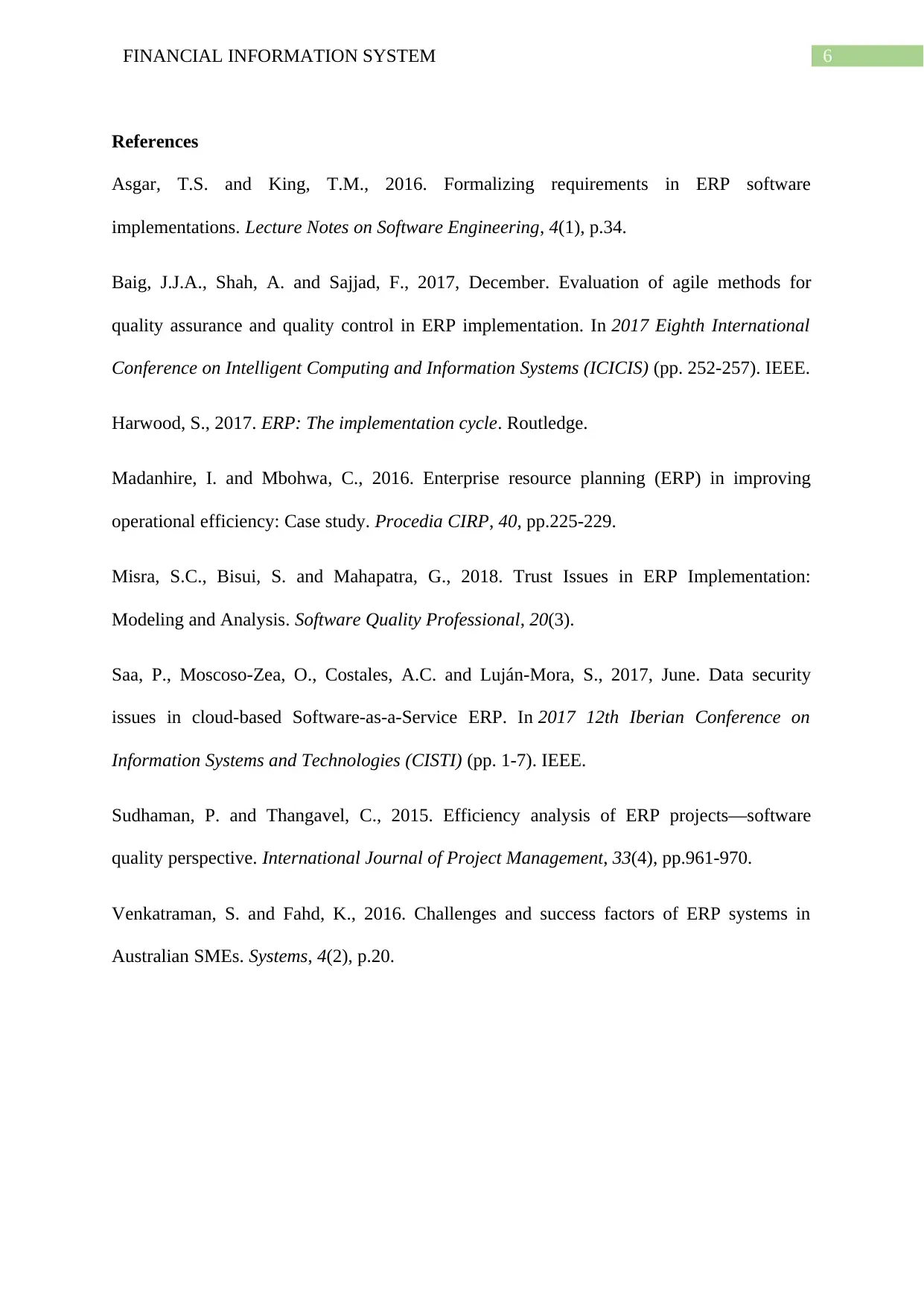
6FINANCIAL INFORMATION SYSTEM
References
Asgar, T.S. and King, T.M., 2016. Formalizing requirements in ERP software
implementations. Lecture Notes on Software Engineering, 4(1), p.34.
Baig, J.J.A., Shah, A. and Sajjad, F., 2017, December. Evaluation of agile methods for
quality assurance and quality control in ERP implementation. In 2017 Eighth International
Conference on Intelligent Computing and Information Systems (ICICIS) (pp. 252-257). IEEE.
Harwood, S., 2017. ERP: The implementation cycle. Routledge.
Madanhire, I. and Mbohwa, C., 2016. Enterprise resource planning (ERP) in improving
operational efficiency: Case study. Procedia CIRP, 40, pp.225-229.
Misra, S.C., Bisui, S. and Mahapatra, G., 2018. Trust Issues in ERP Implementation:
Modeling and Analysis. Software Quality Professional, 20(3).
Saa, P., Moscoso-Zea, O., Costales, A.C. and Luján-Mora, S., 2017, June. Data security
issues in cloud-based Software-as-a-Service ERP. In 2017 12th Iberian Conference on
Information Systems and Technologies (CISTI) (pp. 1-7). IEEE.
Sudhaman, P. and Thangavel, C., 2015. Efficiency analysis of ERP projects—software
quality perspective. International Journal of Project Management, 33(4), pp.961-970.
Venkatraman, S. and Fahd, K., 2016. Challenges and success factors of ERP systems in
Australian SMEs. Systems, 4(2), p.20.
References
Asgar, T.S. and King, T.M., 2016. Formalizing requirements in ERP software
implementations. Lecture Notes on Software Engineering, 4(1), p.34.
Baig, J.J.A., Shah, A. and Sajjad, F., 2017, December. Evaluation of agile methods for
quality assurance and quality control in ERP implementation. In 2017 Eighth International
Conference on Intelligent Computing and Information Systems (ICICIS) (pp. 252-257). IEEE.
Harwood, S., 2017. ERP: The implementation cycle. Routledge.
Madanhire, I. and Mbohwa, C., 2016. Enterprise resource planning (ERP) in improving
operational efficiency: Case study. Procedia CIRP, 40, pp.225-229.
Misra, S.C., Bisui, S. and Mahapatra, G., 2018. Trust Issues in ERP Implementation:
Modeling and Analysis. Software Quality Professional, 20(3).
Saa, P., Moscoso-Zea, O., Costales, A.C. and Luján-Mora, S., 2017, June. Data security
issues in cloud-based Software-as-a-Service ERP. In 2017 12th Iberian Conference on
Information Systems and Technologies (CISTI) (pp. 1-7). IEEE.
Sudhaman, P. and Thangavel, C., 2015. Efficiency analysis of ERP projects—software
quality perspective. International Journal of Project Management, 33(4), pp.961-970.
Venkatraman, S. and Fahd, K., 2016. Challenges and success factors of ERP systems in
Australian SMEs. Systems, 4(2), p.20.
1 out of 7
Related Documents
Your All-in-One AI-Powered Toolkit for Academic Success.
+13062052269
info@desklib.com
Available 24*7 on WhatsApp / Email
![[object Object]](/_next/static/media/star-bottom.7253800d.svg)
Unlock your academic potential
Copyright © 2020–2025 A2Z Services. All Rights Reserved. Developed and managed by ZUCOL.





